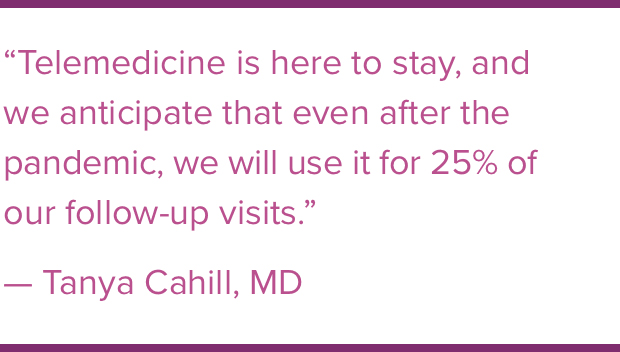NICU Follow-Up Care, Research Continue Despite COVID-19 Disruptions

When COVID-19 hit, parents of medically fragile babies at Cincinnati Children’s began making tough choices. Anxious about the pandemic and worried about possible infection, many pushed for the earliest possible newborn intensive care unit (NICU) discharge date. Neonatologists at Cincinnati Children’s allowed early discharges when it was safe to do so, knowing that close follow-up by the NICU Follow-Up Program would provide needed support. Then parents balked at the idea of bringing their child to the NICU Follow-Up Clinic due to COVID-19 concerns.
Telemedicine emerged as a solution, and implementation happened quickly. Now parents can schedule telemedicine appointments with a neonatologist, pediatrician, nurse practitioner, social worker, registered dietitian, speech-language pathologist, and occupational and physical therapists. Some visits still happen in person, but the clinic offers a comprehensive breadth of services through video visits. Providers can check on the baby’s overall well-being, plan feeding weans, coach parents through a G-tube change, refill prescriptions and answer questions, all without bringing families into the clinic. Some of these offerings were already available through the NICU’s remote patient monitoring program, which began in 2016.

“Between in-person and virtual appointments, our clinic has about the same number of visits as before the pandemic,” says neonatologist Tanya Cahill, MD, medical director of the NICU Follow-Up Clinic. “Telemedicine is here to stay, and we anticipate that even after the pandemic, we will use it for 25% of our follow-up visits.” Parents love the convenience. Many families who weren’t willing to come in for a clinic appointment before will participate in telemedicine appointments.”
The Research Connection
Maintaining consistent follow-up visits is critical to ensure that high-risk babies receive optimal care, but also because the clinic supports numerous research studies taking place at Cincinnati Children’s. One example is the work of neonatologist Nehal A. Parikh, DO, MS, whose research focuses on developing more accurate ways of predicting neurodevelopmental conditions such as cerebral palsy, cognitive impairment, language and speech difficulties, and behavioral problems.
One of his studies, which is funded by the National Institutes of Health (NIH), involves using diffusion magnetic resonance imaging (MRI) methods to identify white matter abnormalities of the brain in premature infants before they are discharged from the NICU. These babies receive ongoing care through the NICU Follow-Up Clinic, including standardized developmental testing at age 2. Parikh hopes that correlating the MRI findings and assessment data will help establish risk stratification for short- and long-term outcomes. The NIH-funded study has enrolled 400 babies so far and will be following them out to 3 years of age.
“If we can risk-stratify babies before they go home from the NICU, we can be judicious about allocating scarce early intervention resources to the patients who need it most,” Parikh says.
Opioid Exposure Clinic Grows
Among the many high-risk patients who are followed in the NICU Follow-Up Clinic are those who were exposed to opioids prenatally or were born with neonatal abstinence syndrome. The neonatal opioid withdrawal syndrome sub-clinic expanded in 2019 and follows about 500 babies, with plans to expand further.
“Cincinnati Children’s has a unique opportunity to help these children because of universal drug testing in our region and access to extensive treatments at the medical center,” says pediatrician Jennifer McAllister, MD, IBCLC, who leads the sub-clinic.
“Our team developed a standardized screening algorithm to identify infants who are at high risk for medical and developmental concerns, such as vision problems, sensory processing disorders and behavior issues. These screenings go above and beyond what a community-based pediatrician can pick up with general screenings. When we identify a concern, our multidisciplinary team provides early interventions.”
McAllister and her colleagues are enrolling patients in a study to quantify the clinical benefit of the algorithm. If the algorithm is useful, the team plans to make it available to providers in rural areas (among others) so that patients can be screened close to home.
Contact Jennifer McAllister to learn more about research in the NICU Follow-up Clinic.

